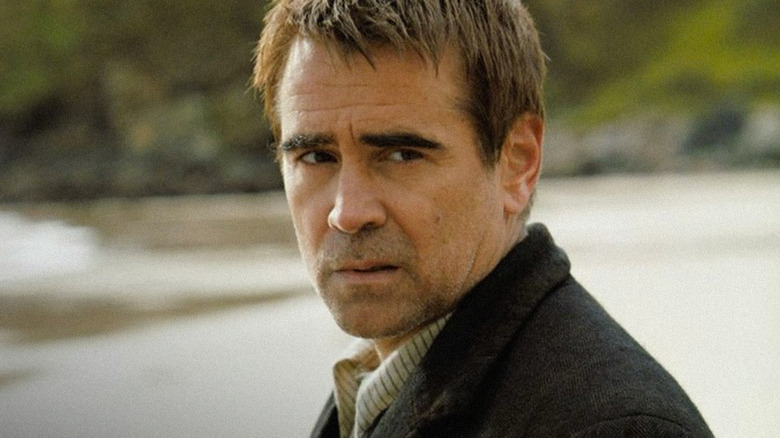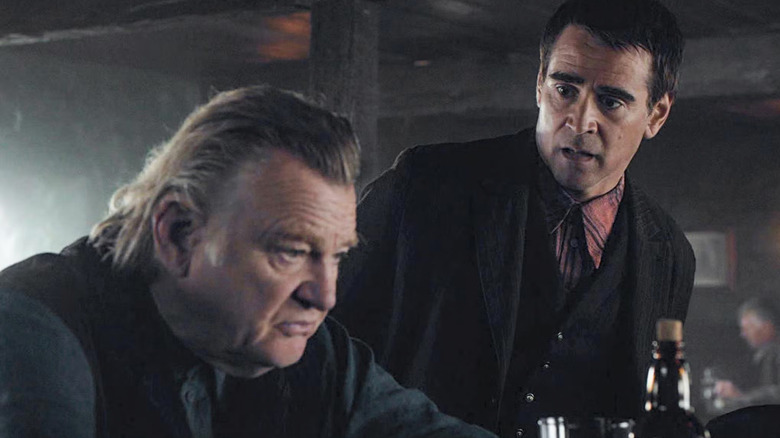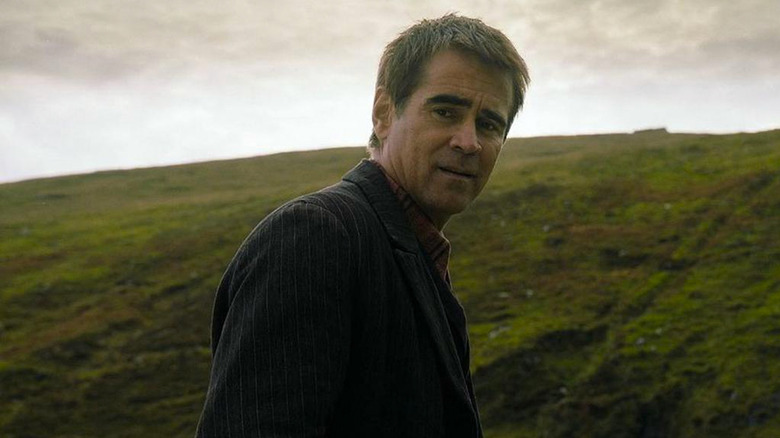The First Draft Of Banshees Of Inisherin Featured A Cool Colin Farrell And A Shootout
"The Banshees of Inisherin" is a film that invites all manner of interpretations. It's a film about a lot of things: mortality, mental health, communication, legacy, and so much more. Underneath all those layers though, and all that existentialism, is one very brutal, tangible break-up.
The concept of civil war is one that looms over Colm (Brendan Gleeson) and Pádriac (Colin Farrell). For one, there's a literal war raging in Ireland, very close to the fictional island of Inisherin, that Pádriac and other characters comment on throughout. But there's also a subliminal battle taking place between the film's two leads. Colm's choice to sever his lifelong friendship with Pádriac feels like a blindsiding ambush. Pádriac's desperate attempts to mend things and reverse Colm's decision play out like advances and retreats across a battlefield. There's Colm's decision to cut off his fingers one by one when Pádriac refuses to accept this new normal — an absolutely wild strategy, but one that adds fuel to the fire nonetheless. And then, of course, there's the collateral damage: Pádriac's beloved pet donkey, those aforementioned fingers, and Colm's dreams of composing music to be remembered by. It's subversive, devastating stuff, but in writer-director Martin McDonagh's first iteration of this story, the battle between Colm and Pádriac was actually a much more literal one.
'The character had a bit of moxie in him'
Farrell, Gleeson, and McDonagh's first collaboration in the dark comedy "In Bruges" cemented a real partnership between them. It's taken years for the trio to collaborate once more, but it was all about finding the right project that could accommodate both Farrell and Gleeson — and live up to the hype of "In Bruges." In a recent interview with Vanity Fair, Farrell revealed that McDonagh was "nervous" to offer up a new project so soon. "[H]e felt 'In Bruges' had enough of a cache of love out in the film-loving community that he didn't want to get me and Brendan together unless it was something that he felt incredibly strongly about," the actor explained.
Reservations aside, McDonagh sent his newest idea to Farrell and Gleeson around seven years ago. "He emailed me and Brendan, 'Hey fellas, here's this script I was working on. Have a look. Tell me what you think.'" In this iteration, Pádriac was nothing like the character we'd see in "The Banshees of Inisherin":
"My character was much cooler in the earlier version. There was a big shoot-out, and at the end, I died bleeding out with a gun in my hand and a chair. The character had a bit of moxie in him."
Said moxie might have appealed to Farrell initially, but it made it difficult for Gleeson to relate to his own character. "Brendan thought the script was great but couldn't understand his character, couldn't find a way in, couldn't find a reason for the severity with which he cuts ties with me," Farrell explained. "And then Martin said, 'I don't like it. Maybe I'll rework it.'"
'Where's the cool guy?'
It would take another four years for McDonagh to return with a rewrite. "We get another email: 'Hey lads, I threw everything out except for the first five pages,'" Farrell continued. "It was the script that we ended up shooting last summer." Naturally, it was much "richer" and "more meaningful" than that first script, but it took Farrell a bit of getting used to all the same:
"When I read it, I was like, 'Oh no, where's the cool guy? Oh, sh**.' I just got a bit nervous. I just found Pádraic's journey so sad. But I just loved it because he had taken a lot of the plot out. He'd taken all the gun shoot-outs, he'd made it way less cool, way less rock and roll and punk, and by simplifying it and literally just making it this kind of existential journey, he just allowed himself to go deeper and deeper, and deeper into the human condition."
In a lot of ways, time was on their side. By taking his time with the script, McDonagh was able to infuse the story with his own personal experiences and bring it to a less bombastic, more human place. "It was really clear that Martin had gone through a little bit of heartache himself that I think he just infused the script with," Farrell added. "When I read the second version, it had a much, much, much greater effect on me." The same could likely be said for audiences everywhere. We may never see that first version of "Banshees," there's truly nothing like the devastating story that McDonagh eventually elected to tell.


